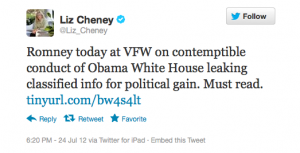I’m Confused. Are THESE Leaks Permissible, or Not?
As you read this Reuters story, remember that the House voted to mandate investigations into leaks that undermined Israel’s case for war against Iran and that the biggest new news in David Sanger’s reporting on StuxNet is that Joe Biden and others believed the Israelis set StuxNet free of Natanz. Leaks that inconvenience Israel’s hawks, you see, are bad, even if they serve US interests.
The Reuters story is a response to two reports in Ha’aretz yesterday that a new NIE–or maybe not an NIE but a top intelligence report–says Iran is closer to developing nukes than the US previously believed.
Defense Minister Ehud Barak confirmed on Thursday Haaretz’s report that President Barack Obama recently received a new National Intelligence Estimate report on the Iranian nuclear program, which shares Israel’s view that Iran has made significant progress toward military nuclear capability, and said that the report has raised the urgency of the issue.
Speaking on Israel Radio on Thursday morning, Barak said that there is a U.S. intelligence report “being passed around senior offices,” and that, as far as Israel knows, this report has brought the U.S. position over Iran closer to the Israeli position, and made the issue more urgent.
[snip]
Haaretz reported on Thursday that the National Intelligence Estimate report on Iran was supposed to have been submitted to Obama a few weeks ago, but it was revised to include new and alarming intelligence information about military components of Iran’s nuclear program. Haaretz has learned that the report’s conclusions are quite similar to those drawn by Israel’s intelligence community.
Not a single member of Congress called for a witch hunt into who leaked the NIE–or maybe not an NIE but a top intelligence report–to Israel and/or Ha’aretz.
Apparently, it’s okay to leak intelligence to Israel if it helps build a case (just in time to roll out a new product in September, I’ll note) for war, but not if it hampers Israel’s efforts to gin up a war. Is that the rule?
If so, what about this Reuters story?
In it, we have anonymous sources back in full force, refuting (sort of) those reports. Note the sourcing.
The United States still believes that Iran is not on the verge of having a nuclear weapon and that Tehran has not made a decision to pursue one, U.S. officials said on Thursday.
[snip]
But a White House National Security Council spokesman disputed the Israeli reports, saying the U.S. intelligence assessment of Iran’s nuclear activities had not changed since intelligence officials delivered testimony to Congress on the issue earlier this year.
“We believe that there is time and space to continue to pursue a diplomatic path, backed by growing international pressure on the Iranian government,” the spokesman said. “We continue to assess that Iran is not on the verge of achieving a nuclear weapon.”
[snip]
Another U.S. official said the United States regularly exchanges intelligence reporting with its allies, which would include Israel.
Apparently, Tommy Vietor (or someone sitting next to him) felt obliged to refute the reports, but would not do so on the record, not even to back his two sentence quote in the Reuters report. It’s okay for Ehud Barak, who was fed this intelligence either in normal intelligence sharing or alternately just handed the US the report in question and now is claiming that the report has been incorporated into the NIE (says a US official who seems determined to provide some explanation for this leak), to talk about leaked US intelligence on the record, but it’s not okay for the NSC spokesperson to do so.
It’s a new twist on the A1 cutout Dick Cheney used, I’m fairly certain: launder the leak through leaks to Israel, because no one in Congress or DC generally (except the FBI) gives a damn about leaks to Israel.
Whatever. I’m thoroughly confused. Am I right that the leak to Israel is considered acceptable but now the sources for the Reuters report will be targets of a witch hunt?

